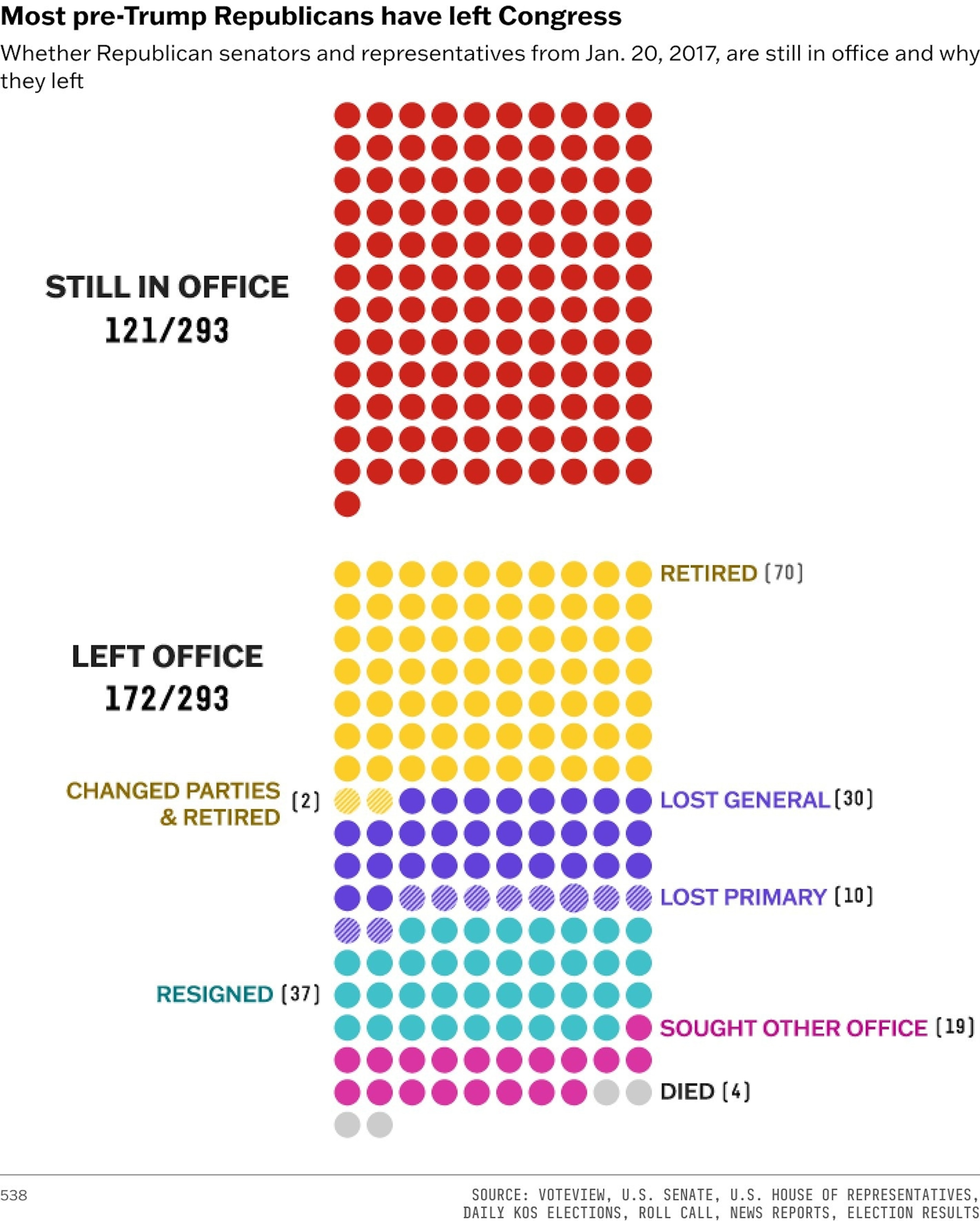The GOP is Trump's party now
Most Republicans in Congress were elected in the Trump era.
When President Donald Trump nominated anti-vaccine activist Robert F. Kennedy Jr. as secretary of health and human services and former Rep. Tulsi Gabbard as director of national intelligence, political observers — us included — wondered whether the Republican-controlled Senate would sign off on these controversial nominees. We likely got our answer last week, when both of their nominations passed out of committee, a good omen for their chances on the Senate floor. No Republican senators voted against them.
In retrospect, this shouldn't have been surprising. Traditional Republicans who might be willing to stand up to Trump are a dying breed in Washington. The GOP caucus saw a record amount of turnover during Trump's first term, with the result that a majority of Republicans in Congress today were first elected in the Trump era — and these new members are more conservative than those they replaced.
Let me take you back just eight years ago to Jan. 20, 2017. On the day Trump took office for the first time, there were 293 Republican members of the House and Senate. Few, if any, of them were products of the Trump movement; the new president had won the Republican nomination over the opposition of many GOP elites, and few had expected him to win the general election and actually serve alongside them.
But Trump proved his doubters wrong and quickly got to work refashioning the Republican Party into the party of Trump. The proof of his success is in the numbers: Today, only 121 of those 293 B.T. (Before Trump) Republican legislators (41 percent) still have an office on Capitol Hill.

Some of this, of course, is normal attrition. Nineteen of the Republicans who left Congress did so to seek another office, something House members do all the time. Thirty lost a general election, indicating they didn't want to leave Congress. Some of the 70 who retired from elected office, such as 82-year-old former Rep. Kay Granger, probably did so for age or health reasons rather than political ones. There were even four Republican members of Congress who died in office.
But some undeniably left because they no longer fit in in Trump's GOP. Most obviously, 10 lost a primary election to a fellow Republican, including former Reps. Liz Cheney, Jaime Herrera Beutler and Tom Rice, who all faced a Trump-backed primary challenger after voting to impeach him in 2021. Several others, like Trump critics former Sen. Jeff Flake and former Rep. Adam Kinzinger, likely chose not to run for reelection because they were worried they would meet the same fate. Other departed Republicans, like former Sen. Rob Portman, former Speaker Paul Ryan and former Rep. Ken Buck, expressed frustration with the direction of their party on their way out the door. Two, former Reps. Justin Amash and Paul Mitchell, even left the Republican Party before retiring from Congress.
We can't give truth serum to every retired Republican to ascertain exactly why they decided to leave, but the data speaks for itself. According to data collected by Ballotpedia and 538, more members of the president's party left the House during 2017-2020 than during any president's first term over the last 60 years.
What's more, the 172 B.T. Republicans no longer in office were, on the whole, a bit more moderate than the 121 who remain. DW-NOMINATE is a metric that quantifies the ideology of members of Congress using their voting records, placing them on a scale from 1 (most conservative) to -1 (most liberal). The average DW-NOMINATE score of the 172 departed members was 0.480, but the average score of those who remain is 0.493. And while 59 percent of B.T. Republicans overall are no longer in office, over two-thirds of those who had DW-NOMINATE scores under 0.300 are now gone.
But the departure of this generally more moderate bloc of Republicans is only half the story. Equally important is how conservative their replacements are. In addition to the 121 holdovers, 150 Republicans have been elected to the House or Senate since 2017.* Thirty-two of them were just elected for the first time in 2024, so they don't have a DW-NOMINATE score yet because they haven't taken enough votes, but the other 118 of them have an average DW-NOMINATE score of 0.544 — significantly more conservative than not only the 172 Republicans they replaced, but also their 121 longer-tenured colleagues.
This group includes 21 recently elected Republicans with DW-NOMINATE scores above 0.700, including firebrands like Reps. Lauren Boebert and Marjorie Taylor Greene and Sen. Tommy Tuberville. It includes only 10 Republicans with DW-NOMINATE scores under 0.300. This is virtually the mirror image of the B.T. Republicans they replaced: 10 of them had scores above 0.700, while 23 had scores below 0.300.
More conservative voting records don't necessarily equate to "Trumpier" (although the term "conservative" has been redefined in recent years to be basically synonymous with pro-Trump), but this new cadre is pretty Trumpy, too. Trump endorsed 69 percent (104 of 150) of them in their most recent Republican primaries, compared with 74 percent (89) of the 121 holdovers from before his first term. Granted, Trump is not stingy about handing out endorsements — especially to incumbents who are already virtually guaranteed to win their primary — but he does bestow them only on people who are in his good graces. So it's fair to say that a majority of these newcomers, and of Republicans as a whole, are at least tolerant of Trumpism — if not full-throated fans of it.
With Republicans in full control of the federal government, Trump's opponents are basically powerless to do anything but hope that people within his own party will check his power. But the days of former Sens. Mitt Romney and John McCain standing up to Trump are largely over, because people like Mitt Romney and John McCain aren't in Congress anymore. The Republican caucus is mostly not the same as it was in Trump's first term, so don't expect the president to meet the same resistance.
Footnotes
*The remaining 22 B.T. Republicans from 2017 were replaced by Democrats.




